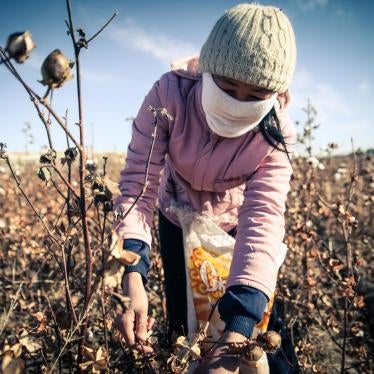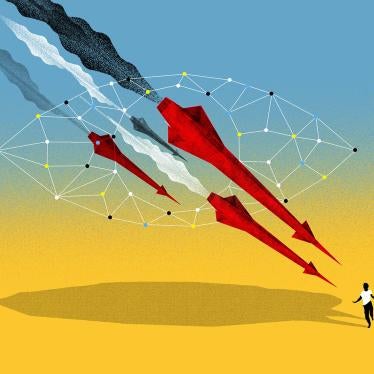Letter regarding the upcoming one-year assessment of the Uzbek government’s compliance with the series of benchmarks adopted by the European Bank for Reconstruction and Development (EBRD) in its March 2003 country strategy for Uzbekistan.
We are turning to you specifically with respect to the three benchmarks that pertain to human rights: (1) greater political openness and freedom of the media; (2) registration and free functioning of independent civil society groups; and (3) implementation of the recommendations of the United Nations (U.N.) Special Rapporteur on torture following his November 2002 country visit to Uzbekistan.
One year after the adoption of the EBRD country strategy, it is clear that the Uzbek government did not implement the necessary reforms.
It persecutes human rights defenders and obstructs human rights work, in violation of its obligations under international law. Authorities steadfastly refuse to allow independent human rights groups to register, restricting their operation and rendering them vulnerable to harassment and abuse.
Torture and ill-treatment in Uzbek prisons and police detention facilities remain widespread, and occur with near-total impunity. Since May 2003 alone, four people have died in police custody, apparently due to torture. Although more than a year has elapsed since the U.N. Special Rapporteur on torture’s report on Uzbekistan was made public, the Uzbek government has not yet published a final National Action Plan for implementing his recommendations, despite promises to release a final version before the end of 2003. The government’s approach to the National Action Plan, coupled with the continuing and persistent reports of torture and of torture-related deaths in custody in the past year, raises doubts about its will to implement the necessary reforms and safeguards.
The government’s violent crackdown against independent Muslims, whom it claims are “religious extremists,” continues unabated, with no progress on the sorely-needed legal reforms that would improve the climate for religious freedom.
Political opposition groups remain unregistered, and face harassment and arbitrary detention for gathering informally or discussing political issues. Violations of press freedoms continue despite the lifting in May 2002 of the official censorship policy.
The Uzbek government’s failure to make credible progress in meeting the benchmarks must carry real consequences. We recommend that the EBRD undertake the following action:
1. Suspend all public sector lending to the Uzbek government until such time as the government demonstrates a genuine willingness and makes substantial, measurable progress toward meeting the benchmarks. Exceptions could be made for projects that directly affect the health, education, and well-being of the general population. Projects falling into these categories, however, should be closely monitored to ensure that they serve their intended purpose. The EBRD should also inform the World Bank, the Asian Development Bank, the International Monetary Fund and other international financial institutions and bilateral donors about its decision.
2. Continue to use the benchmarks as policy tools for reform. We firmly believe that if properly supported by resources and political will, these benchmarks have a real potential to trigger human rights reforms in Uzbekistan. We encourage the EBRD to make the most of its political mandate and use the benchmarks to press for tangible reforms. To this end, and in order to maximize the utility of the benchmarks, we propose that the EBRD articulate the specific steps the Uzbek government would need to take in each area in order to be considered in compliance with the respective goals. Among such steps are the following:
- Expedite the process of implementation of the recommendations of the U.N. Special Rapporteur on torture, in particular introduction of habeas corpus (judicial review of detention), and thorough and impartial investigations into claims of torture or ill-treatment, with particular attention to cases that resulted in death; make the results of these investigations public and hold accountable those found responsible for abuse.
- Release arbitrarily detained human rights defenders, including Ruslan Sharipov, pending an independent review of any charges or court orders against them, and cease any further arrest and harassment of human rights defenders, including the legal proceedings against Elena Urlaeva.
- Register independent human rights groups, including the Human Rights Society of Uzbekistan, Mazlum, the Committee of Legal Assistance to Prisoners, Mothers against the Death Penalty and Torture, and the Initiative Group of Independent Human Rights Defenders, and lift unjustified restrictions on the operation of civil society groups, including those affecting international groups.
- Register political opposition parties such as Erk (“Freedom”) and Birlik (“Unity”) and cease any harassment against opposition political activists.
- Ensure genuine media freedom, including by allowing newspapers closed since spring 2002, when censorship was officially lifted, to reopen; ending the practice of summoning newspaper editors to the government offices to instruct them what articles they should allow to be printed; investigating attacks on journalists and bringing to justice those found responsible; and ending the use of registration and tax laws to impede the operation of the media.
3. In partnership with other actors of the international community, including the U.N. and the Organization for Security and Cooperation in Europe (OSCE), and in close consultation with civil society, the EBRD should set up a coherent system of sustained monitoring of Uzbekistan’s progress in meeting the benchmarks. The Bank can be most effective if its shareholder governments and other relevant actors of the international community are prepared to advance the benchmarks as part of their overall dialogues with the Uzbek leadership. A coordinated approach by the Bank, its shareholders, and the international community at large is clearly the most effective path to achieving tangible change in Uzbekistan.
4. Issue periodic public statements to reaffirm reform demands, and actively engage partner institutions and civil society groups in mounting pressure on the Uzbek government to implement the necessary reforms. Since the publication of the country strategy and the annual meeting in Tashkent, the EBRD has, to our knowledge, not made a single public statement evaluating Uzbek government progress, encouraging the government to take the steps necessary to meet the benchmarks, or even commenting on the significance of the benchmarks for further engagement with the Uzbek government. We encourage the Bank to use public engagement as a tool for pressing the Uzbek government to meet the benchmarks.
At the end of the country strategy period, in March 2005, the EBRD will no doubt revisit Uzbekistan’s progress. It is our view that if by this time the government has met the benchmarks, the Bank should reconsider engagement with the public sector. If the government again fails to implement the necessary reforms, the Bank should seriously consider putting a halt to all lending to Uzbekistan, again with a narrowly-drawn and closely-monitored exception for essential services to the general population.
Thank you for your attention to our concerns. We wish you a productive discussion and look forward to learning about the outcome.
Sincerely,
Andijan Center for Democratic Initiatives
CEE Bankwatch Network
Committee for Legal Assistance to Prisoners
Ezgulik
Human Rights Society of Uzbekistan
Human Rights Watch
Initiative Group of Independent Human Rights Defenders of Uzbekistan
Komil Ashurov
Legal Aid Society
Mazlum Organization for the Protection of Inalienable Rights
Mothers against the Death Penalty and Torture
Ozod Ovoz
Cc: Jean Lemierre, President, EBRD
Johnny Åkerholm, Secretary-General, EBRD






